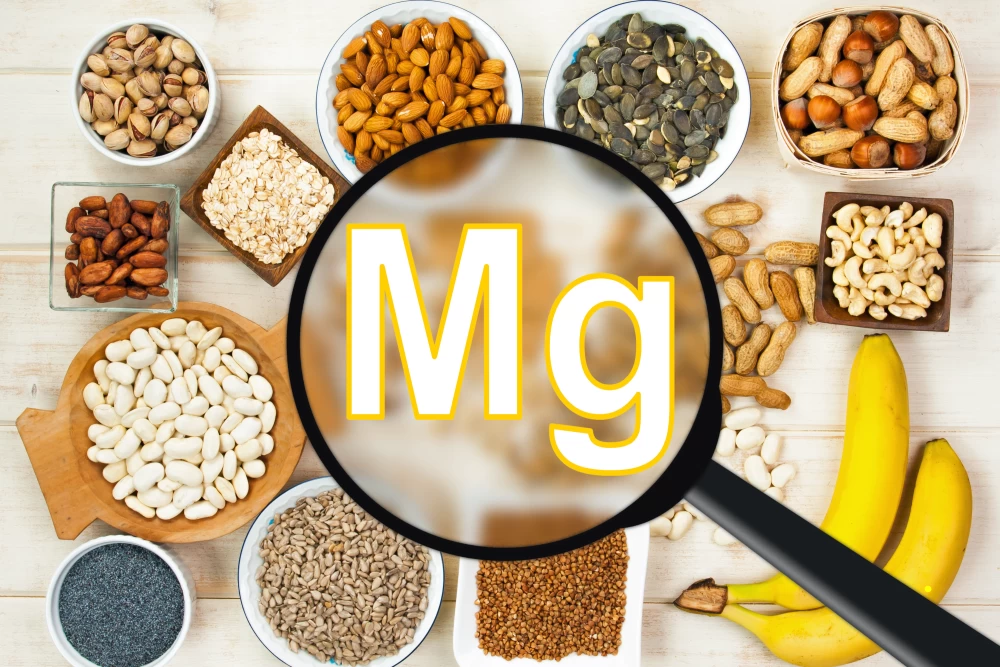
- 26th February 2025
Table of Contents
- Why magnesium matters
- Who may be at risk
- Signs that suggest checking magnesium
- Magnesium for sleep, mood and brain function
- Magnesium, energy and metabolism
- Heart health and magnesium
- Magnesium-rich foods — practical table
- Supplements — forms and when to consider them
- Safety considerations
- Practical daily tips
- Related resources and internal links
- Take-Home Messages
Magnesium’s Secret Power — What It Does and How to Get Enough
By Dr. Pankaj Kumar, General Physician. Book a consultation • Practo profile
| Quick fact | Value |
|---|---|
| Typical adult magnesium intake target | Approximately 300–400 mg/day (varies by age and sex) |
| Top food sources | Leafy greens, nuts, seeds, legumes, whole grains, dark chocolate |
| When to test | Persistent cramps, arrhythmia, unexplained fatigue, or malabsorption |

Magnesium is essential for energy production, nerve and muscle function, sleep regulation and cardiovascular health. While it is not a cure-all, many adults have intake below recommended levels. This guide explains signs of low magnesium, food sources, supplement forms, safety points and practical tips for general adults.
Why magnesium matters
Magnesium is a cofactor in many enzymatic reactions including those needed for cellular energy (adenosine triphosphate synthesis), nerve signalling and muscle contraction. Adequate magnesium supports normal neuromuscular and cardiovascular function and contributes to metabolic health.
Authoritative resource: NIH Office of Dietary Supplements magnesium factsheet (see References).
Who may be at risk
Risk groups include older adults, people with chronic diarrhoea or malabsorption, those on certain medications (eg, loop diuretics, proton pump inhibitors), and adults who consume highly processed diets low in whole foods.
| Risk group | Why |
|---|---|
| Older adults | Lower dietary intake and reduced absorption with age |
| Frequent diarrhoea or malabsorption | Increased gastrointestinal losses and impaired absorption |
| High sugar and refined diets | Low magnesium density in processed foods; reduced whole-food intake |
Signs that suggest checking magnesium
- Persistent muscle cramps, fasciculations or restless legs
- Chronic fatigue not explained by sleep or other causes
- New-onset palpitations or arrhythmia (seek urgent review)
- Poor sleep quality despite good sleep hygiene
Note: these symptoms are non-specific and overlap with other conditions. Clinical assessment and targeted testing are recommended rather than self-diagnosis.
Magnesium for sleep, mood and brain function
Magnesium participates in neurotransmitter modulation and may improve subjective sleep quality in some adults, particularly where baseline magnesium is low. Evidence varies; benefits are most consistent when deficiency or low intake is present.
Magnesium, energy and metabolism
Magnesium binds to and stabilises ATP, so it is integral to cellular energy processing. Observational studies link low magnesium status with insulin resistance; some trials suggest modest improvements in metabolic markers with supplementation in selected populations. Magnesium is supportive but not a primary therapy for diabetes or obesity.
Heart health and magnesium
Magnesium helps regulate vascular tone and cardiac rhythm. Meta-analyses report modest blood-pressure reductions with supplementation in certain populations. Patients with arrhythmias should consult their physician before starting supplements.
Magnesium-rich foods — practical table
Prefer whole foods first. Approximate magnesium per serving (food composition data; values rounded).
| Food (serving) | Approx mg | Why / Use tips |
|---|---|---|
| Cooked spinach (1 cup) | ~150 mg | High magnesium; mix into dals or curries. |
| Pumpkin seeds (30 g) | ~150 mg | Rich plant source; use roasted as topping or snack. |
| Almonds (30 g) | ~75 mg | Convenient snack; calorie-dense—watch portions. |
| Brown rice (1/2 cup cooked) | ~70 mg | Whole grain option to increase magnesium and fibre. |
| Dark chocolate (30 g, 70%+) | ~60 mg | Small treat providing magnesium—consume in moderation. |
Supplements — forms and when to consider them
Common supplement forms:
- Magnesium glycinate — well tolerated, gentle on the gut; commonly used for sleep/anxiety support.
- Magnesium citrate — good absorption; at higher doses may have a laxative effect (useful for constipation).
- Magnesium oxide — widely available but less bioavailable and more likely to cause GI effects.
Typical supplemental elemental magnesium doses range from 100 to 400 mg daily depending on need. Do not exceed recommended doses without clinician oversight. Patients with kidney dysfunction should not take magnesium supplements without medical supervision.
Safety considerations
| Situation | Recommendation |
|---|---|
| Kidney disease | Avoid supplements unless supervised by nephrology; risk of accumulation. |
| Pregnancy / breastfeeding | Prefer dietary sources; supplements only with clinician advice. |
| Concurrent medications | Magnesium can interfere with some antibiotics and bisphosphonates; separate dosing as advised by clinician. |
Practical daily tips
- Add a portion of cooked greens or a handful of seeds/nuts daily.
- Swap refined grains for whole grains or millets when possible.
- If muscle cramps or sleep problems persist despite diet changes, discuss testing and a clinician-supervised supplement trial (glycinate preferred for sleep support).
Related resources and internal links
For personalised plans and medical review, consider the Lifestyle Modification Program. Learn more about Dr. Pankaj Kumar or book an online consultation. See program results and testimonials on the portfolio.














